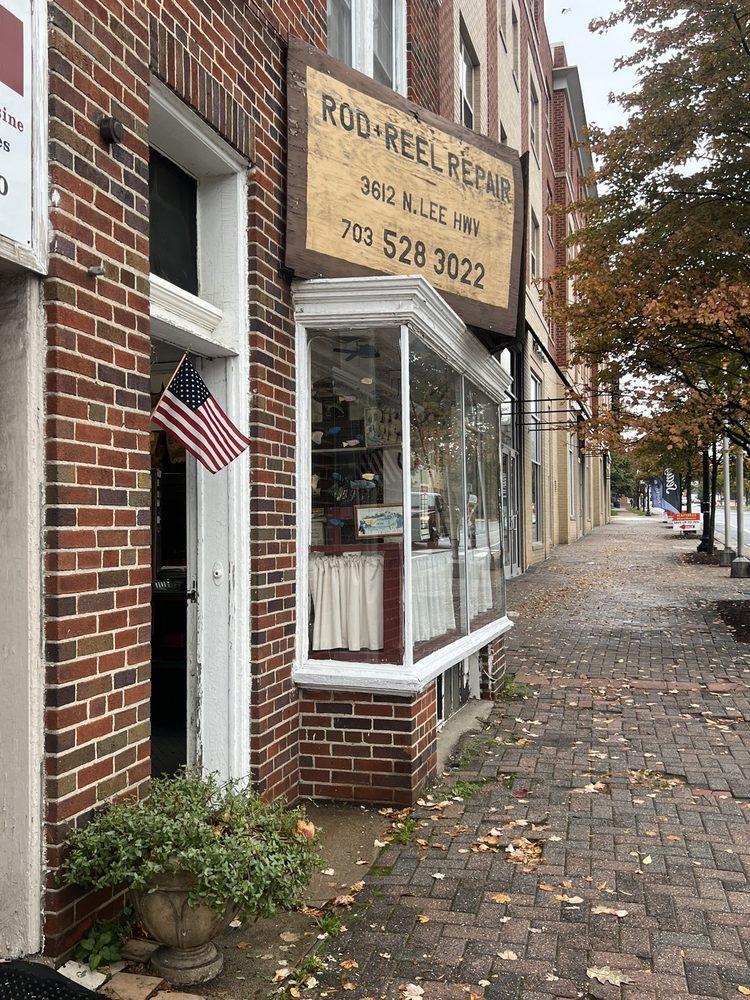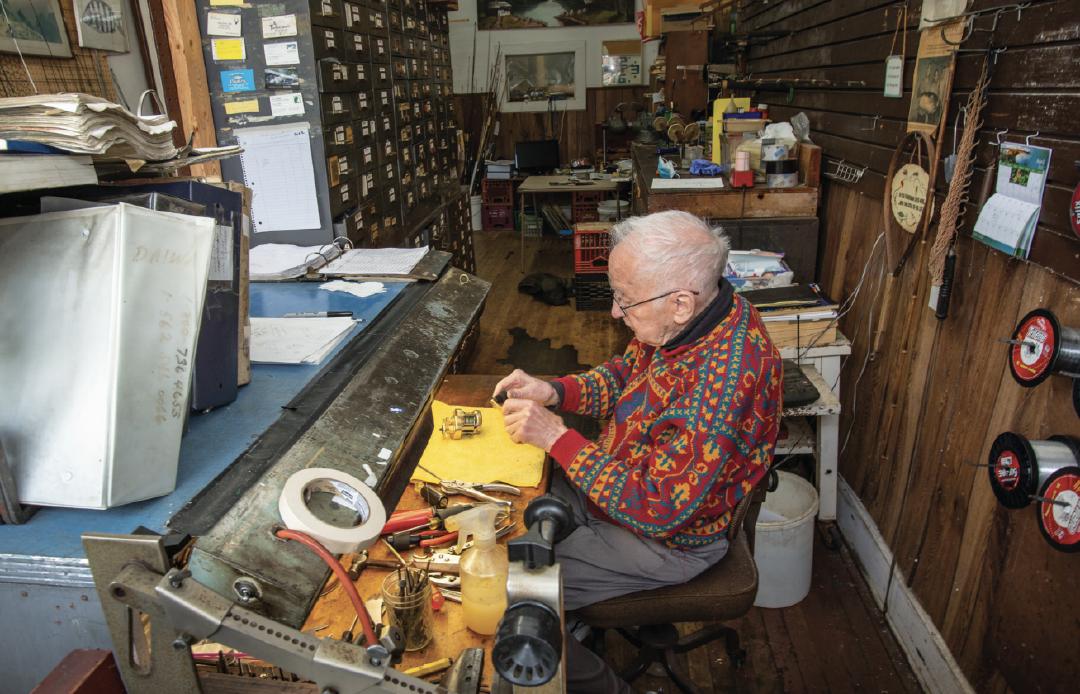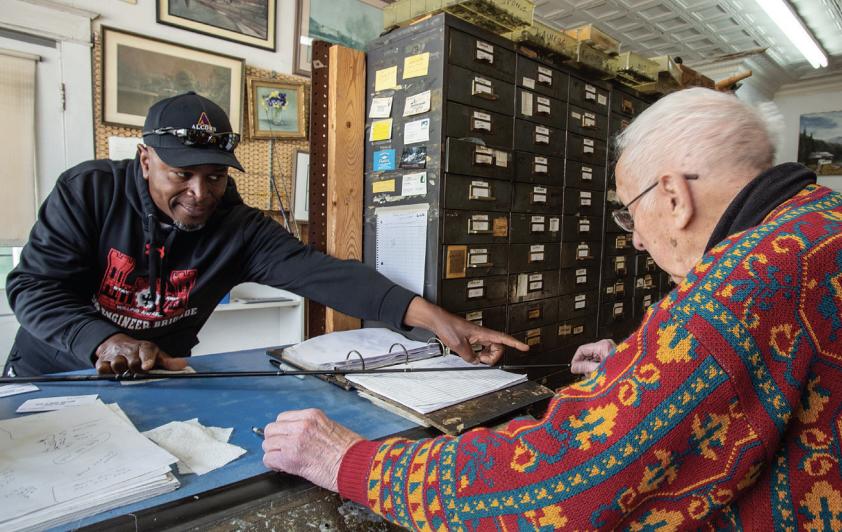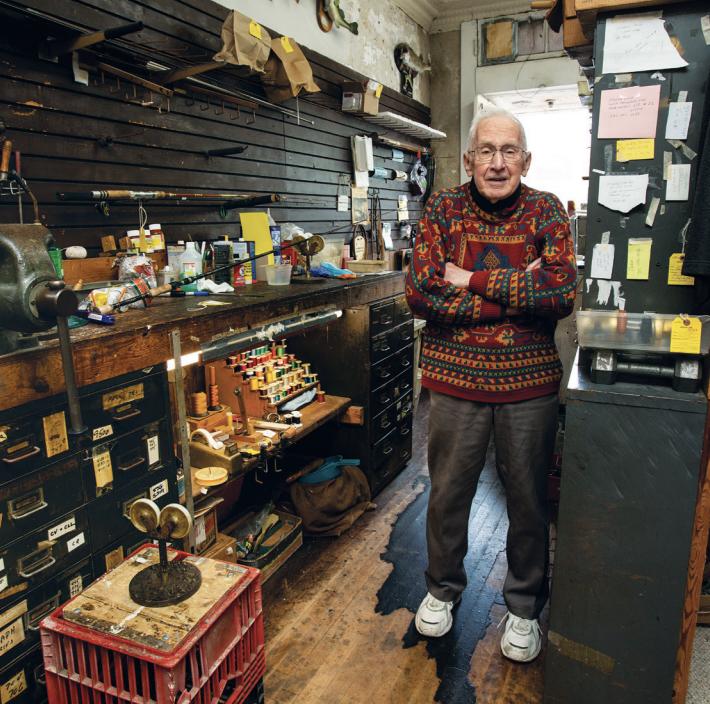The Shop Time Forgot

For three decades, Phil Evans of Rod & Reel Repair has been part of the heart of Northern Virginia’s angling community.
This article first appeared in Virginia Wildlife Magazine's September – October 2022 Issue and is used with permission by the author.
It’s not easy to interview an icon. By icon, I mean someone who’s a mainstay of a community and has already had articles written about him in the popular, cosmopolitan Washingtonian magazine and the venerable, outdoorsy Field & Stream. And that is what describes Phil Evans.
Phil has owned and operated Rod & Reel Repair in Arlington since 1993—and would, due to his service to the fishing community, be considered by many to be Northern Virginia’s “go-to” guy for fishing gear repair.
I met Phil on a bright winter Saturday morning before opening hours at his understated, one-room shop on Langston (previously Lee) Boulevard for a quick chat amongst the unclaimed rods and reels for sale and those waiting for repair. While a fishing show plays on a TV in the background,
Phil tells me he isn’t a native Virginian but instead was born in Scranton, Pennsylvania, in 1934. As the work got scarce in the Pennsylvania coal mines, Phil’s family picked up and left Scranton when his father and mother found government work at the Pentagon during World War II.
Phil never finished high school and worked as an office boy at the Washington Evening Star newspaper. He eventually returned to school, got his GED, and studied computer programming and data processing in community college.
After working in that field for a while, Phil started to learn rod and reel repair at a local Herman’s Sporting Goods in Washington, D.C. He eventually opened Rod & Reel Repair in the ’80s with stops in Washington, D.C., and Mt. Rainier, Maryland. He finally settled into his Arlington location in 1993. He lives above the store and commutes down the stairs each day. But after nearly 40 years in business—and at almost 88 years young—he wants a well-deserved break from “scrubbing fishing reels.” So, as Phil puts it, he’s selling out.
Phil has been fishing since he was 12 years old. He smiles when he recalls his many boyhood memories in Arlington, telling me how he and his pals would grab their bikes and head to local fishing holes to chase whatever fish would grab their hooks. You can see a twinkle in Phil’s eyes when he tells me that the fishing of his youth in Northern Virginia was “wonderful,” hitting places like Roaches Run and Gravelly Point with his buddies for perch, catfish, and carp and D.C.’s tidal basin for carp and black crappie.
Interestingly, Phil says that largemouth bass fishing is much better today than it was in his younger days; he also remembers that there were phenomenal herring and striper runs in the Potomac but that the super popular shad runs of today were pretty sparse.
The youthful anglers kept just about everything they caught—and ate those deemed safe. Phil says that even back then, there were public health advisories on which fish were okay to consume. He tells me that in those days, the Potomac River was a “polluted mess.” Interestingly, today, some consider the Potomac’s waters clean enough that there is a movement to re-open the river to public swimming. Phil quickly credits President Lyndon Johnson and his 1966 Clean Waters Restoration Act for the tremendous progress in ameliorating the Potomac’s water quality—and the subsequent improvement in the fishery.
Though a conventional gear angler at heart, as an adult, he also enjoyed fishing for brook trout in Shenandoah National Park with buddies, catching them on the fly. Or, as Phil laughingly puts it: “Chasing four-inch fish while getting lost in the woods.”
He is heartened by the fact that Virginia has such an incredible variety of fish and fishing today, commenting on how newcomers to the area have added a new vibrancy to the Northern Virginia fishing scene.
Though he may be ready to end his nine-to-five routine of many years at the shop, he still has some fishing to do. On his bucket list is fishing for tarpon in Florida, no doubt influenced by the book Lords of the Fly: Madness, Obsession, and the Hunt for the World-Record Tarpon, which he pulls off a shelf and passes on to me to read—and then instructs me to pass on to another angler when I’m done.
I asked him why he hadn’t retired earlier? He responded: “Habit,” adding, “I worked long, but not that hard." I then asked him how the “big box” sporting goods stores—the bane of many smaller fishing shops—affected his business? He looked at me quizzically, saying that since he does repair, he doesn’t see the big box stores as competition and receives many referrals from them. With a sense of pride, Phil says he’s one of the few and maybe the only shop around the area that does repairs of rods and reels, giving his place a unique niche in the local fishing business scene.
Asked what he would have liked to have done if he hadn’t opened this shop, Phil says he has no regrets but would’ve maybe liked to have been a doctor to help fix up people just like he fixes up rods and reels.
I can see that. In retirement, he plans to move from his apartment above the shop, get a room near a library, and read a lot of books, sharing with me a list of works handwritten on the back of a piece of scrap cardboard. The weighty list includes the likes of Bertrand Russell, a British mathematician, essayist, and philosopher.
In closing our conversation, I asked Phil what his favorite local place to fish was, thinking he probably had a few of them coming to the area in 1943. (I, of course, was scheming to get some good “intel” for my local fishing outings.) As I breathlessly got ready to take down the “lat and long” of the locations of his favorite spots on my notepad, I sensed a pause in the cadence of the conversation. I looked up at Phil, who had a mischievous smile. He said: “I’m sorry, Pete, but I can’t tell you.” As anglers often do, Phil didn’t want to “hotspot” any local fishing holes or give away any cherished secrets to this budding outdoor writer and avid angler. I let out a heavy sigh and smiled back, disappointed with his sudden case of “lock-jaw”—that condition every angler dreads when the fish just don’t seem willing to open their mouths to take the hook.
Oh well. But, in truth, his totally understandable reticence on this matter makes me more fully appreciate why Phil and his long-serving Arlington rod and reel repair shop are considered pillars of Northern Virginia’s vibrant fishing community.
Dr. Peter Brookes is a D.C. foreign policy nerd by day and an award-winning Virginia outdoor writer by night.
Images



